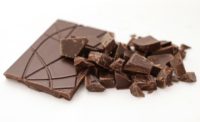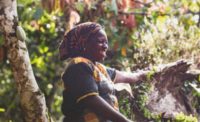Design firm introduces takeaway containers made with cacao industry byproduct
PriestmanGoode aims to reduce use of single-use plastics in light of COVID-19 pandemic.

London-based design studio PriestmanGoode has unveiled new designs using cacao industry byproduct to help reduce plastic packaging used in takeaway food deliveries.
The project is the latest concept the studio has created that highlights how design thinking can tackle issues in everyday life and lead toward a more sustainable future.
“We wanted to re-think food delivery and takeaway in a bid to minimize the environmental impact of convenience culture,” said Jo Rowan, associate director of strategy at PriestmanGoode.
Online food delivery and takeaway is a market worth over $53 billion a year globally. This is according to figures released in 2019, before the global COVID-19 pandemic, which has already affected the takeaway industry, with thousands of restaurants in the UK signing up to delivery platforms since March as the lockdown came into force. Between this, and the continued rise in the convenience of online ordering through platforms such as Deliveroo and UberEats in the UK, or GrubHub in the U.S., means an increase in takeaway food culture.
“We began this project before the pandemic took hold, with a goal to design takeaway packaging as a desirable object; create something that customers would value and that would lead to positive changes in behavior,” Rowan said. “This has become even more important now, as there has been a rise in at home dining and the concept of ‘tablescaping’ — elaborate, decorative table arrangements — has moved from social events into the home. It presents an opportunity for design to create PriestmanGoode tackles takeaway culture with sustainable food packaging something that can contribute to a sense of occasion, that is beautiful, practical and sustainable. As a society, we have to move away from a culture of disposables, and focus on principles of circular economy.”
At the heart of PriestmanGoode’s new concept in re-thinking takeaway culture are:
- The return of reusables: Creating products with value and creating a system whereby consumers are rewarded for positive behavior
- Sustainable materials: Alternatives to plastics, working with natural materials wherever possible
- Zero waste: Alternative biodegradable solutions to clingfilm to combat leaks and spills
- Universal packaging: Bento box-style containers instantly halve the amount of packaging required, by removing lids. The packaging is designed to be transferable between restaurants
- Dining experience: Creating packaging that can be used for presentation, contributing to creating a sense of occasion at home
- Improved delivery quality: Temperature control, delivery efficiency
PriestmanGoode researched food-safe materials that could replace plastic containers that are currently in use and explored options to replace single-use plastics. Materials had to meet a range of criteria from heat proof, lightweight or recyclable to insulating.
“We looked at a broad spectrum of materials, from those that are at an early stage of development, to commercially available materials made from byproducts and low impact materials derived from nature, that will either biodegrade or can be reused,” said Maria Kafel-Bentkowska, head of CMF.
PriestmanGoode selected the following materials and material partners:
- Bioplastic for the containers: Made from byproduct from the cacao industry. This material has been created by designer Paula Nerlich.
- Mycellium for insulation: Created by design studio Ty Syml, mycellium is a material that is grown using waste from the food industry to create a lightweight material ideally suited for insulation in the takeaway delivery bag.
- Lexcell by Yulex for the food container and bag handles: 100 percent plant-based, neoprene-free specialty natural rubber material. The natural rubber is sourced only from plantations with Forest Stewardship Counsel (FSC) certification.
- Nuatan by Crafting Plastics for the bag (outer): Made from 100 percent renewable raw resources, biodegradable, can withstand high temperatures and would withstand the pressure if dropped.
- Piñatex for the bag lid: Piñatex is a natural leather alternative made from cellulose fibers extracted from pineapple leaves.
PriestmanGoode also selected material designer Margarita Talep, who has created algae-based materials to replace single-use or disposable plastics. These could be used to replace cling-film, which is currently used to prevent spills while in transit.
The idea behind this new concept is that customers would pay a small fee for the packaging upon ordering the food, which would be reimbursed on their next delivery, when the containers are returned to the delivery service provider. The containers would then be washed by the next restaurant/food provider before being used again.
“We know that adding a value has an impact on behavior,” Rowan said. “In the UK, plastic bag consumption in supermarkets went down 90 percent since the introduction of the 5p — and subsequently 10p — tax in 2015. Provided with the right incentives, we know that consumers are willing and able to quickly modify their behaviors to more sustainable patterns. Introducing a reward-based system, whereby consumers would be given incentives, such as discounts, for returning takeaway packaging into the system, we know would have a positive impact.”
Working with circular models presents its own set of challenges, particularly at this time. The COVID-19 pandemic has had a big impact on behavior and on the focus of the conversation.
“Understandably, hygiene and safety have risen to the top of the agenda, but it’s imperative that we continue to push for innovation towards a more sustainable future,” Kafel-Bentkowska said. “The two things have to go hand in hand, we cannot focus on hygiene at the expense of the environment. We have been talking to our material partners about antimicrobial additives that could be applied to our selected materials to enhance safety, without having a negative impact on the environment.”
PriestmanGoode’s concept is featured in Wallpaper* magazine’s August issue. The concept will be exhibited at the Salone del Mobile in 2021 as part of the Wallpaper* Re-Made exhibition.
Looking for a reprint of this article?
From high-res PDFs to custom plaques, order your copy today!





